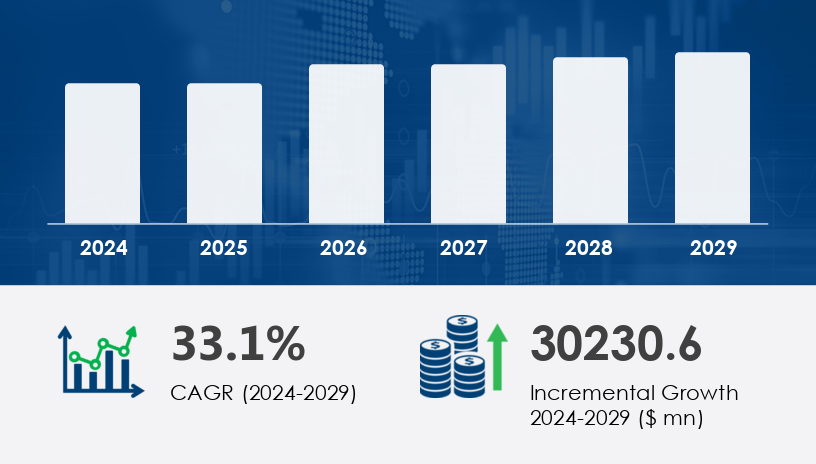The artificial intelligence (AI) market in healthcare is witnessing a transformative boom, driven by the integration of intelligent systems into clinical settings. In 2024, the market was valued at a substantial base, and it is forecast to expand by USD 30.23 billion by 2029, growing at a robust CAGR of 33.1% during the 2024–2029 period.For more details about the industry, get the PDF sample report for free

A key driver accelerating the artificial intelligence (AI) market in healthcare is the global push for digitization in the healthcare ecosystem. AI technologies such as machine learning, artificial neural networks, and deep learning are increasingly being applied to large datasets from digital health records and IoT devices. This integration enables enhanced clinical decision-making, predictive analytics for chronic diseases, and development of personalized medicines. With these capabilities, healthcare systems are achieving greater efficiency in patient care, from diagnostics to medication management. AI-driven applications are also proving valuable in areas like telehealth, drug discovery, and real-time analytics, paving the way for more responsive and cost-effective healthcare solutions.
One of the most significant trends shaping the artificial intelligence (AI) market in healthcare is the emergence of AI-based tools in elderly care. With aging populations across key regions, there is a growing demand for technologies that support efficient, personalized care delivery. AI-powered solutions such as companion robots, virtual assistants, and personalized care plans are addressing this need by improving patient engagement, enabling remote health monitoring, and supporting caregivers. Moreover, cloud computing and IoT integration further enhance these capabilities, making AI a critical component in the evolving elderly care landscape.
By Application:
Medical Imaging and Diagnostics
Drug Discovery
Virtual Assistants
Operations Management
Others
By Component:
Software
Hardware
Services
By End-user:
Hospitals and Clinics
Research Institutes and Academies
By Geography:
North America
Europe
APAC
South America
Middle East and Africa (MEA)
Get more details by ordering the complete report
The medical imaging and diagnostics segment stands out as the leading application area within the artificial intelligence (AI) market in healthcare. This segment was valued at USD 1.52 billion in 2019 and has shown consistent growth throughout the forecast period. AI technologies are revolutionizing diagnostic processes by analyzing vast quantities of medical images—such as CT scans, MRIs, and X-rays—with increased accuracy and speed. These intelligent systems assist clinicians in early detection of diseases, particularly chronic and complex conditions like cancer. As per analysts, the application of machine learning and deep learning algorithms in imaging diagnostics is significantly improving diagnostic precision, ultimately enhancing patient outcomes and streamlining clinical workflows.
Covered Regions:
North America
Europe
APAC
South America
Middle East and Africa (MEA)
For more details about the industry, get the PDF sample report for free
North America is the dominant region in the artificial intelligence (AI) market in healthcare, contributing approximately 38% to the market’s overall growth during the forecast period. The United States and Canada are leading the charge due to their advanced technological infrastructure and substantial investment from both public and private sectors. The US, in particular, holds a significant number of AI patents and leads globally in research and deployment. Applications of AI in North America span predictive analytics, content analytics, and real-time insights derived from electronic health records and wearable devices. Analysts highlight that strong IT infrastructure, early adoption of digital health tools, and robust funding mechanisms are key enablers for AI expansion in this region.
Despite its rapid advancement, the artificial intelligence (AI) market in healthcare faces a major hurdle—physician and provider skepticism. Concerns around data privacy, algorithmic accuracy, and job displacement remain prevalent among healthcare professionals. Additionally, the integration of AI into clinical workflows often requires significant changes in operations and retraining, which can face resistance. Ensuring data standardization and cybersecurity adds further complexity. These factors create friction in the widespread adoption of AI technologies, slowing down implementation rates despite evident benefits.
For more details about the industry, get the PDF sample report for free
Companies operating in the artificial intelligence (AI) market in healthcare are actively pursuing strategic alliances, product innovation, mergers and acquisitions, and geographic expansion to strengthen their market presence. Innovations include AI-based solutions for genomic sequencing, smart hospital systems, personalized care planning, and real-time patient monitoring through wearable devices.
Prominent players include:
Aidoc
Google LLC
Amazon.com Inc.
GE Healthcare Technologies Inc.
Intel Corp.
NVIDIA Corp.
Medtronic Plc
Microsoft Corp.
IBM Corp.
Siemens Healthineers AG
These companies are leveraging their expertise in AI, cloud computing, and big data to offer cutting-edge healthcare solutions. According to analysts, companies focusing on the software segment—especially those using deep learning and non-procedural languages—are gaining a competitive advantage in areas such as medical imaging, patient data analysis, and workflow optimization.
Introduction
Market Drivers and Trends
Industry Insights Overview
Market Segmentation
Regional Outlook
Market Challenges
Market Research Overview
Research Analysis Overview
Conclusion
Safe and Secure SSL Encrypted